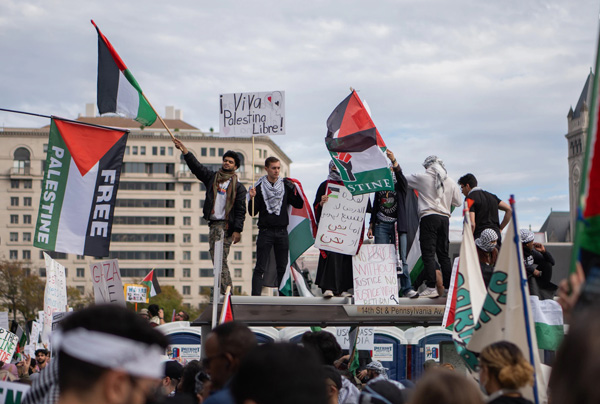Pro-Palestine university students nationwide protest in solidarity with Palestine

[A group of people standing on top of a wooden platform. Photo credit: Unsplash]
On April 17th, pro-Palestine protests increased in number, with most taking place on university campuses around the United States.
For the past few weeks, pro-Palestine university students across the United States have been protesting against the conflict in Palestine.
Out of 50 states, 46 states have seen at least one pro-Palestine protest.
Students at universities like UCLA, Princeton, USC, University of Michigan, DePaul University, Northwestern, MIT, Yale University, NYU, and more are currently protesting on their campuses in support of Palestine.
Several social media outlets, including TikTok, show videos of university students protesting on campuses and the various ways they are demonstrating.
For example, university students chant, pray, and sing for the freedom of Gaza nationwide on campuses.
They have also set up encampments on school campuses, which universities claim violate school policies, yet the students are not swayed.
Throughout the duration of the protests, several university students have faced consequences from their universities and from the police.
So far, as of May 6th, over 2,000 university students have been arrested by the police.
However, on Tuesday, April 30th, Brown University proposed an unusual compromise.
Brown University decided to make a deal with the protesters: if they take down the encampments, Brown university’s leaders will host a meeting to discuss cutting ties with companies connected to the Israeli military in Gaza.
Other major universities, including Northwestern, Rutgers, and the University of Minnesota, are also seeking agreements with the protesters.
These universities have proposed several ideas that vary by institution, including divestment meetings, funding for Palestinian students, expanding spaces for Arab students, and creating affiliations with Palestinian universities.
This example has created hope nationwide among pro-Palestine university students that change can occur through the voices of students.
Even though the protests seem to be effective, many universities are modifying or canceling commencement ceremonies for safety reasons.
Despite the warnings from the universities, they seem ineffective in deterring the students.
Several students have also gone on hunger strikes at universities.
Recently, Princeton students initiated a hunger strike “in solidarity with Gaza,” with at least 17 undergraduates participating.
The Princeton protesters demand that the university stop investing in Israel militaries and affiliations tied to the military.
Princeton University leaders have sent a group of physicians to watch over the health of the students participating in the hunger strike.
Despite all efforts by the government and universities to quiet the protests, they have now spread globally to Europe, Australia, and Canada, which demonstrates the power of protests.
Since the protests are led by the younger generation, they show how impactful and powerful the voices of the next generation can be.
University students nationwide wish for the freedom of Palestine, and by demonstrating through protests, they effectively display that even students are able to create change.

- Yeonwoo Ko / Grade 10 Session 4
- Adlai E Stevenson High School

![THE HERALD STUDENT REPORTERS [US]](/assets/images/logo_student_us.png)
![THE HERALD STUDENT REPORTERS [Canada]](/assets/images/logo_student_ca.png)
